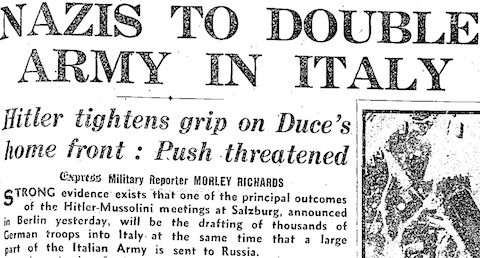
All the newspapers today carry news of the meeting between Hitler and Mussolini in Salzburg; only the Daily Express leads with it. Its angle is that there is ‘STRONG evidence’ that the two dictators agreed that Italy would sent ‘a large part’ of its army to Russia, while Germany would send ‘thousands’ of its soldiers to Italy (1). Two possible explanations are given for this apparently contrary strategy: ‘A coming extension of the Mediterranean Front’, or ‘to prevent any chance of armed insurrection by the Italian Army’. The Italian people are said to be ‘thoroughly discontented with their acutely depressed conditions’ and so Mussolini has given his prefects ‘supreme powers to deal with “possible future difficulties of an urgent nature”‘ (his own words), and the Gestapo is now in control of the Italian police. Where Morley Richards, the author of this piece, gets his information from is not clear; none of the other papers make the same claims. Indeed, the circumstances surrounding the meeting are rather ‘mysterious’; the Yorkshire Press asks why Japan apparently was not represented and was not mentioned in the final communique — even though the only public reference to the meeting beforehand was a garbled one in a Tokyo newspaper (1).
Most of the other newspapers choose to lead with the fighting retreat of the Chinese north of Lashio. Japanese forces are now ‘within 20 miles of Mandalay, wartime capital of Burma’; there is a ‘fierce battle raging on the Irrawaddy front South-West of Mandalay as British troops withdraw to the North bank of the river’ (Yorkshire Post, 1). Elsewhere in the war against Japan, there was what is officially described (by MacArthur’s headquarters) as a ‘brilliant’ attack on the Japanese airfield at Lae, ‘scoring many direct hits on a line of 30 ‘planes’ (Manchester Guardian, 7). The besieged fortress island of Corregidor suffered 12 Japanese air raids on Thursday as well as shelling from artillery; return fire hit ‘enemy batteries, truck columns, and supply dumps’. There is apparently still resistance elsewhere in Luzon, since a radio broadcast from Tokyo says a ‘smashing Japanese attack’ on Mount Pinatubo ‘compelled the enemy to flee in wild disorder’ (The Times, 4). Allied political and military leaders have been talking up the Japanese threat. Prime Minister Smuts, said in Pretoria yesterday that ‘we must prepare for the menace from Japan’ (3). ‘If that danger materializes and approaches our shores’,
I hope that all sections will be united in facing that danger — whatever colour of their skin — rather than go under […] I want the people of South Africa to go all out. I want to increase our defence forces on a basis that will make South Africa secure against any such menace.
Meanwhile General Blamey, in his first meeting with journalists since becoming commander of ‘all land forces in the South-West Pacific area’, claimed that ‘the Japanese threat to Australia, far from diminishing, had actually increased’, despite the buildup of Allied forces in Australia (Guardian, 6). He said that Japan has reinforced its forces to the north-east of Australia, and might attempt to take Darwin or Port Moresby, ‘strategically important to either side […] as jumping-off points’.
Whatever the Japanese plan affecting the Australian area may be, it would involve inevitably stretching and straining his communications. Our most important points are at least 1,000 miles from the enemy’s. If a fight comes we will give a good account of ourselves.
The full moon helped RAF night fighters shoot down eleven German raiders on Thursday night, out of less than fifty total. Four of these ‘fell to a Beaufighter squadron led by Wing Commander Max Aitken, D.F.C., Lord Beaverbrook’s son’, who himself got one of them (The Times, 4). Others were brought down by anti-aircraft guns, including two by a battery in the northeast. The battery itself was hit by bombs, and a number of papers today carry articles praising the bravery of its ATS members under fire: Gunner Edwina Mills, Lance-Bombardier Alma Wilson, and especially Gunner Emily Walcott, ’22-year-old West Indies girl’ and formerly ‘a dancer in Lew Lake’s “Junior Blackbirds”‘ (Express, 3). Gunner Walcott, a radio-location operator, was knocked off her feet by bomb blast.
While on the floor, badly shaken, she began to switch off the power, got to her feet, and, with her girl co-operator, switched off the voltage.
Said the battery commander: “By her action she saved the crew from being exposed to danger of being electrocuted.”
None of the German raids were heavy; instead, The Times‘s air correspondent suggests,
the enemy resumed his old policy of scattered raids by one or two aircraft, probably with the object of allowing German propagandists to announce that widespread attacks has been made.
The Minister for Home Security, Herbert Morrison, spoke to Shoreditch civil defence workers yesterday, saying (2):
Now the Nazis are taking it. Not with the fortitude of our people, but with the whining which we are accustomed to hear from the bully who is given a taste of his own medicine. Our aerial counter-offensive has continued the attack on the heart of industrial Germany: the factories, the docks, and the shipyards. Now comes the Nazi answer — Hitler’s blow for blow — Bath, Norwich, York. A gem of Regency architecture for a U-boat base, an ancient church for a shipyard, old and beautiful monuments for a Heinkel works. These are not the replies of a man who carefully plans a strategic campaign. They are the frenzied blows of a mad lout who, stung by the carefully timed and aimed blows of a cool and skilful opponent, loses all self-control and runs amuck.
An article in the Daily Mirror by E. H. Christian assesses the civil defence response to the recent German raids (2). In general the tale is a happy one, reflected in the headline ‘Renewed air raids found us ready’:
Every service that can be put on wheels has been rushed to the aid of stricken towns — mobile Assistance Board units, mobile restaurants, post and pensions offices, and inquiry and advice bureaux […] Stores of food and clothing — held at strategic points in the various regions — have been quickly rushed where they were required. Increased provision of surface shelters has proved invaluable.
However, outside the organised civil defence services, many people appear to have become lax:
volunteer firewatching, the provision of sand bins and buckets of water at each house, and the keeping of emergency kits are precautions that have been sadly neglected by far too many people.
Anderson shelters have not been maintained so are ‘almost unusable’; gas masks are ‘almost an unknown sight’ in some of the towns recently blitzed.
The moral for everyone is not to feel too safe. Don’t depend on the Civil Defence services until you have completed your own precautions.
The Mirror also has this little paragraph on the front page, with the headline ‘9th Day of Blitz’:
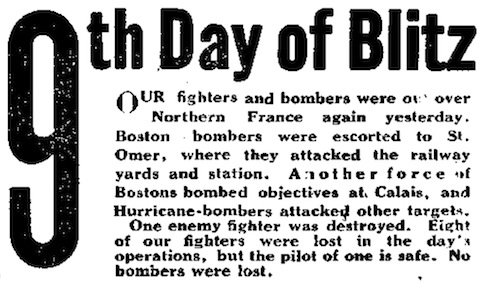
But it’s referring, not to the German blitz on Britain, but the British blitz on Germany (or northern France, rather). And it’s referring to daylight attacks, for as The Times notes, ‘For the first time since April 21 there was no night activity by our bombers’ (4). It goes on to explain that
Decision as to whether bombers shall be sent out or kept at home on any particular night is a matter for the Commander-in-Chief, Bomber Command, and his decision may depend on any of a number of considerations. For instance, though the weather may be good over this country, it does not necessarily follow that it is good over Germany; or the weather forecasts may indicate early morning fog at the time our bombers would be returning to their bases. For that reason, the final word must be with the Commander-in-Chief and his staff, who are in possession of facts which cannot be known to anyone outside the command.
And that Commander-in-Chief is ‘Air Marshal Arthur Travers Harris, who reached his 50th birthday a month ago, the man behind our attacks on Rostock and Lubeck, on Augsburg and the Renault and Matford works around Paris’ (Express, 2). Basil Cardew paints a brief pen-portrait of Harris, who took over Bomber Command on 25 February this year, in today’s Express:
He wants to be getting on with the job all the time, personally and by direct action. In an airplane he will not be piloted, but takes the controls himself. In his car he is impatient of being driven and takes over the wheel himself.
He has no time to waste, this shrewd dynamo of air strategy.
While allowing that ‘His approach to a problem may seem disconcerting to the official mind’ and ‘So, too, do his abrupt questions seem unless the man he is talking to really knows his job’, Cardew thinks Harris can ‘bridge the gap’ between the planners and the aircrew:
His decisions have a quality of action. You can feel the stamp of his mind on the dash across Germany to Augsburg. And there is no doubt that bomber crews feel this — that their commander is mere figure spinning plans in an inaccessible headquarters. He is a man with the same cast of thought as themselves.
In Cardew’s opinion, Harris ‘is a first-class commander in a good English tradition, downright like Fisher, abrupt like Wellington‘.
![]() This work is licensed under a Creative Commons Attribution-NonCommercial-NoDerivatives 4.0 International License.
Permissions beyond the scope of this license may be available at http://airminded.org/copyright/.
This work is licensed under a Creative Commons Attribution-NonCommercial-NoDerivatives 4.0 International License.
Permissions beyond the scope of this license may be available at http://airminded.org/copyright/.


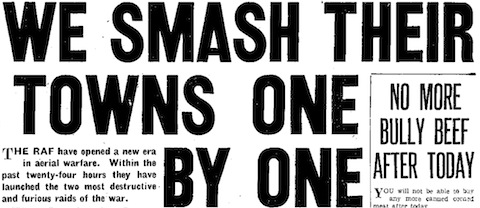

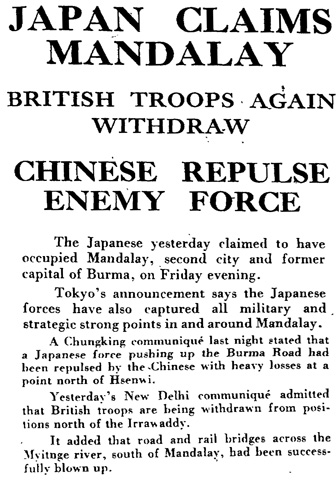
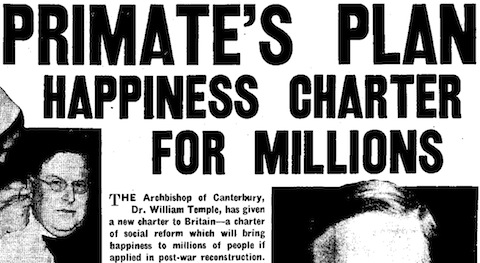
Gunner Emily Walcott, ’22-year-old West Indies girl’ and formerly ‘a dancer in Lew Lake’s “Junior Blackbirds”‘ (Express, 3). Gunner Walcott, a radio-location operator
Hitler’s worst nightmare – a jazz-dancing racial degenerate virago with a tachymetric predictor and a couple of cavity magnetrons. Like everything Nazis hated rolled into one young lady.
And, just to rub salt into the wounds, she won. Well, her side did, anyway. I found it interesting that not much was made of her race, the Mirror doesn’t even mention her West Indian background (she may have been British-born — her home is given as Cardiff); on the other hand, her photo appeared prominently in several papers and her non-white heritage is quite obvious. What did readers make of her? What did the press think they would make of her?